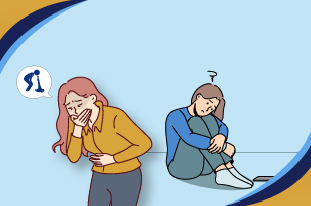Have you ever felt persistent worry and fear in a relationship? Initially, any relationship appears ideal, with comfort, joy, and deep connection. But as time passes, this happiness turns into worries, possessiveness, and doubts. Yet, for many, the very idea of a romantic partnership can become a source of major apprehension. This persistent worry and fear can fade the romantic relationship. When these worries matter to you more than the person, it turns out to be a concern and is termed relationship anxiety.
It goes beyond normal jitters, often leads to considerable stress for both individuals, and can profoundly affect the health or longevity of the relationship.
Relationship anxiety stems from endless worries and fears about the partner and related romantic associations. The main causes could be insecurities, past experiences, and affection issues. It can result in distress for both of them and impact their relationship. The signs could be continuous reassurance-seeking, overthinking, depression, fear of abandonment, and difficulty trusting the partner.
Signs of What Relationship Anxiety Looks Like?
Anxiety in a relationship manifests in many ways. Most of the time, it causes people to feel permanently on the anxiety border.
At some time, they might find themselves constantly questioning relationships and their partners.
Will this romantic feeling last long? How do I know if the person I love is right for me? What if we are hiding some dark secrets about our lives? Is he/she cheating on me?
Understanding the following signs and overcoming them is the first step toward a healthy relationship and finding relief.

Constantly Seeking Reassurance
A key indicator of relationship anxiety is the persistent need for confirmation. People find themselves frequently asking partners about their feelings, their commitment to the relationship, or whether they are truly happy being with them.
This is not a healthy communication, as some might feel it, but rather it’s an obsessive impulse for repeated verifications that rarely bring lasting peace. The constant questioning might bring stress and doubts.
For example, a study published in the Journal Of Anxiety Disorders found a clear correlation between anxious attachment and increased reassurance-seeking behaviors in relationships, which highlights how deeply rooted these patterns can be.
Read More: Knowing Anxiety Levels For A Helpful Treatment
Overthinking About Interaction
Do you question in your mind about every word, tone, style, and facial expression of your partner? Do you replay all these things in your mind? This excessive thinking and analysis of interactions, conversations, and actions is a major sign of relationship anxiety disorder. This overthinking often comes from a fear of misinterpretation or a continuous search for hidden meanings, which can be exhausting and unproductive.
A Deep-Seated Fear Of Abandonment
One of the most potent emotional symptoms of relationship anxiety is a fear of abandonment, or abrupt end. This fear can be so strong enough to influence daily findings, decisions, and behavior. The butterflies in your stomach turn into a constant state of stress. While some worry is normal, excessive stress can be disruptive.
Research in development psychology often links this fear to early experiences of insecure attachments.
Struggling With Trust
Even though there is no definite reason for doubt, people with relationship anxiety can find it difficult to trust their partner’s intentions. This may raise questions about honesty, fidelity, and dedication, which then bring a strained and uncertain dynamic. Trust is the core of any healthy relationship, and its erosion due to anxiety can make a painful cycle.
Excessive Worry About The Relationship’s Future
Beyond fear of abandonment, there is often a pervasive and streaming worry about the relationship’s future, partner’s well-being, and their feelings for you. This worry can consume your sentiments and restrict you from fully enjoying the present moments with your partner.
Frequent Jealousy and Insecurity
When relationship anxiety is present, you might experience feelings of jealousy regarding your partner’s interactions with others. This can extend to friends, family members, or colleagues, which means an underlying sense of not being “enough” for a partner or a fear of being replaced by them.
Avoiding Important Conversations
When you are avoiding difficult conversations or conflicts with the fear of upsetting your partner, it can be defined as relationship anxiety. While it may seem like a way to maintain peace, hiding concerns or disagreements eventually prevents the genuine solution and can lead to resentment. Psychologists suggest that healthy conflict is necessary for relationship growth.
Read More: Can Anxiety Cause Chest Pain and Shortness of Breath?
Why Does Relationship Anxiety Happen? Find The Roots
Finding the origins of the relationship anxiety can empower you to address its causes effectively.
Insecurities and Self-Worth
“One of the most powerful antidotes to relationship anxiety lies in learning how to practice self-compassion and give yourself grace when things don’t go according to plan.” Kristin Neff
At the center of relationship anxiety lie a person’s underlying feelings of inadequacy and worthlessness. When you have doubts about your values and worthiness, it can be challenging to accept that someone else can truly value and love you unconditionally. This internal struggle often projects onto an external relationship.
Effect of Past Experiences
Previous traumatic or bad relationship experiences, whether romantic or familial, can seriously contribute to the development of relationship anxiety. For example, growing up in an environment with unreliable caregivers or past betrayals can create a template for expecting similar results in a present relationship. The brain, to protect itself, can become hyper-vigilant.
Attachment Styles
Early childhood experiences contribute to shaping your affection style, which then influences how you approach and behave in adult relationships. Research by psychologists John Bowlby and Mary Ainsworth considerably details attachment theory. For example, a person with an “anxious-preoccupied” attachment style usually develops an intense fear of desertion due to unusual caregiving in their early years. This can lead to a strong desire for intimacy that is coupled with a persistent fear that others will not reciprocate that intimacy or will someday leave.
In contrast, an “avoidant” attachment style, also rooted in early experience, can lead to a tendency to withdraw when intimacy deepens. Such persons paradoxically create distance to avoid anticipated hurt. When you understand attachment style, it can provide a powerful lens through which you can view your relationship patterns.

Practical Steps and Support to Navigate Relationship Anxiety
The steps to overcome relationship anxiety involve a multi-faceted psychological strategy that focuses on inner change and improved relational patterns.
Read More: Let’s Talk About The Relationship Between ADHD and Anxiety
Find Professional Psychiatric Guidance
The research and engagement with qualified therapists can provide invaluable tools and support. They can help with “how to overcome relationship anxiety”. Cognitive Behavioral Therapy (CBT) is most effective in providing solutions for anxiety disorders. The method helps individuals to identify and challenge negative thought patterns that fuel anxiety and enables them to replace these with more realistic and positive perspectives. You can learn to reframe anxious thoughts and develop healthier relationships through established exercises. Additionally, psychodynamic therapy can help individuals find the roots of their anxiety and relationships, including early life experiences and attachment patterns.
Practice Open Communication
The most effective and helpful method to fix relationship anxiety is open and honest communication with your partner. This method helps build trust and mutual understanding with them. When you share your fears and worries in a vulnerable yet clear manner, your partner can get an idea of your internal experiences and offer appropriate support. In other words, they can be therapists for relationship anxiety.
Give Priority To Self-Care
Being involved in activities that promote relaxation and overall well-being is necessary for managing anxiety. This can include practices such as meditation, regular exercise, maintaining a balanced diet, and spending quality time with loved on or hobbies that enhance mood and bring you joy. These self-care practices can help regulate your nervous system, reduce overall stress levels, and encourage a stronger sense of self-worth independent of your relationship.
For example, studies have suggested that regular physical activity can reduce excessive anxiety and depression by influencing neurotransmitters in the brain.
Practice Mindfulness Daily
Mindfulness methods can be powerful for managing anxiety at the time. Practices like deep breathing exercises, body scans, or focusing on your five senses can help ground you in the present, reducing the overwhelming nature of anxious thoughts. Another method for anxiety control is the 3-3-3. Mindfulness cultivates an awareness of your thoughts and feelings without judgment, allowing you to observe them without being destroyed by them.
Read More: Can Anxiety Cause Dizziness? A Complete Understanding Of The Link
Limit Reassurance Seeking Behaviors
While it is necessary to seek reassurance in a relationship, constant and frequent reassurance can lead to anxiety. Other than relying on your partner for validation, focus on building self-confidence and trust in your own abilities. Gradually reducing reassurance seeking can help break the cycle of anxiety and empower you to find protection within yourself.
Build Healthy Boundaries
Set up healthy boundaries in your relationship. This is necessary for preventing overwhelming feelings and protecting your personal well-being. Clear boundaries can help understanding and let both individuals feel protected and understood.
Relationship anxiety is challenging, but it is absolutely possible to manage and transform it. With the proper understanding of signs and causes, and by seeking the help of medical professionals, one can move towards building more secure, fulfilling, and joyful relationships.
Orange Coast Psychiatry understands that no relationship is certain, and that is hard to accept. You can entirely avoid all relationship anxiety, and we will help you with that. Our psychiatrists understand relationship anxiety disorder symptoms and provide you with suitable solutions as per your requirements.

















